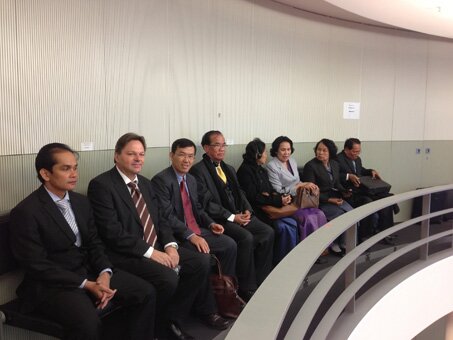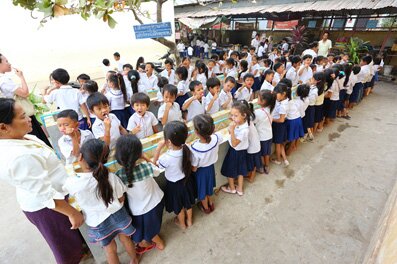Coaching Sessions for medical professionals to improve immediate newborn care
Kampong Thom Province, Cambodia While Cambodia’s under-five mortality rate declined from 83 deaths per 1000 live births in 2005 to 54 in 2010, the neonatal mortality rate has stagnated during the same time frame (28 deaths/1000 live births in 2005 and 27 deaths/1000 live births in 2010). Neonatal deaths now account for more than half of all under-five deaths in Cambodia. The most common causes include infection, birth asphyxia and preterm deliveries.
Simple health procedures can save newborns lives
Preventative measures such as thorough drying, skin to skin contact, properly timed cord clamping and early breastfeeding have been show to save newborn’s lives. Additionally, ventilation of non-breathing babies within one minute after birth, or within the vital “golden minute” also contributes to saving newborns at risk of post-natal death..
Immediate and thorough drying stimulates breathing and prevents hypothermia. Amongst many other benefits, sustained skin-to-skin contact initiates colonization of the newborn with maternal flora. Delaying cord clamping reduces the risk of anemia in preterm infants, and intraventricular hemorrhages. Early initiation and exclusive breastfeeding can prevent more than 95% of neonatal sepsis deaths.
Hands-on coaching sessions improve medical response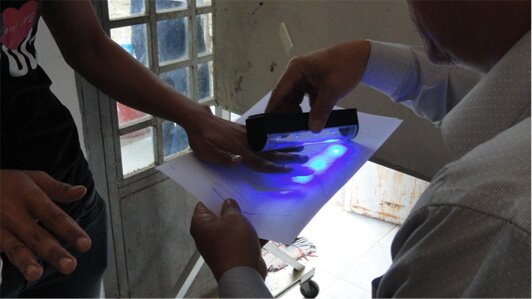
Emphasizing the need to reduce neonatal mortality, Cambodia’s Ministry of Health requested WHO’s support to strengthen immediate newborn care in Kampong Cham province. In 2011, Dr. Howard Sobel (WHO) and Ms. Chris Newsome (pediatric nurse, RACHA), developed a 2-day training and piloted it in Kampong Cham province.
Based on the success of the pilot, the Ministry of Health decided to roll-out this training nationwide. Training of trainers for the Provincial Health Department and Operational District staff from all provinces is ongoing and will be finalized in 2013. Three facilitators and 5 co-facilitators from Kampong Thom province have already been trained in December 2012.
The Immediate Newborn Care (INC) coaching sessions are very hands-on. There are no lectures and all information is provided to participants in the form of questions. Evaluations during the training include written tests (pre- and post-test), measures of hand hygiene (using Glow Germ – see image) and demonstrations of the sequential steps. At the end of the second day, each participant has to demonstrate that he or she is able to carry out all steps of immediate newborn care in the correct order and in the correct time frame.
The steps for the breathing and non-breathing baby are assessed in two separate demonstrations and role-plays. If the participant is able to repeat the correct steps during a follow up supervision visit at the health facility, he or she will be given a certificate of successful course completion.
GIZ support contributes to 4 coaching sessions – 40 midwives trained
With the technical and financial support of the GIZ Rights Based Family Planning and Maternal Health project (Muskoka), the INC facilitators in Kampong Thom conducted 4 coaching sessions at the Baray Santuk referral hospitals in February and March 2013. A total of 40 midwives successfully demonstrated mastery of the sequential steps that may save a newborn’s life. Evaluations during the training include written tests (pre- and post-test), measures of hand hygiene (using Glow Germ) and demonstrations of the sequential steps.
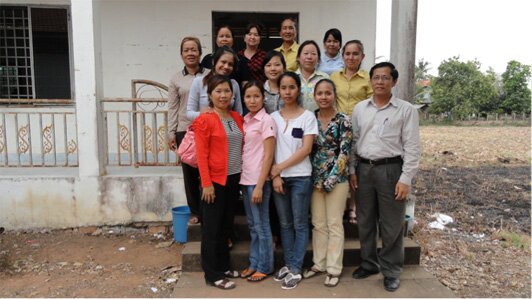 Nine coaching sessions ahead for 2013 – 130 medical professionals await training
Nine coaching sessions ahead for 2013 – 130 medical professionals await training
With 9 additional coaching sessions planned in 2013, a total of 130 midwives and doctors will become proficient in correct immediate newborn care in Kampong Thom province. Giving health care workers the skills they need to provide all newborns with the care they require in the first minutes of life is a big step towards increasing the chances of survival for these precious new lives.
For more information please contact:
Dr. Klaus Hornetz
Email: [email protected]
Tel: + 855 23 72 63 44
Author:
Karin Stubenbaum
GIZ MCH Advisor, Kampong Thom
Cambodian Officials Visit German Parliament to Improve Transparency of Public Finances
Phnom Penh, Cambodia During a recent study visit to Germany, Cambodian officials from the National Audit Authority, the Senate and Parliament had the opportunity to gain first-hand knowledge on how the close cooperation between the German Parliament and the German audit authority enhances transparency and accountability in the use and management of public resources.
Mr. Juergen Lehmberg, Team Leader of the GIZ project supporting the National Audit Authority in Cambodia, said during the study
visit “We expect that some of the best practices we have seen from German institutions will inspire participants to reflect on how similar models can be applied in Cambodia to make management of public funds more transparent and meaningful for all citizens”.
The Cambodian delegation visited Germany on March 18-27, 2013 and comprised Her Excellency Som Kimsuor, Audit General of the National Audit Authority; H.E. Chea Chet, Chairman of the Commission on Economy Finance Banking and Audit of the Senate; and H.E. Khek Sam On, member of the Commission on Economy Finance Banking and Audit of the National Assembly.
The Cambodian National Audit Authority was founded in 2000 to audit the Government’s budgeting and to guarantee proper management of public funds. The GIZ National Audit Authority Project began in 2006 with the goal of improving transparency and reliability of the Cambodian public finance system, including the implementation of regulations as part of the Second Strategic Development Plan of the Cambodian National Audit Authority.
Further information:
Mr. Juergen Lehmberg
Team Leader of the GIZ Support to the National Audit Authority Project
Tel: (+855) 12 333 101
Email: [email protected]
Say Cheese: Nearly 8,000 primary school children brushing their teeth and washing their hands to prevent disease
Phnom Penh, Kompot, Takeo, Kompong Thom, and Kompong Chhnang Provinces, Cambodia – Children throughout Cambodia are busy washing their hands and brushing their teeth in efforts to prevent disease and promote good hygiene.
“Thanks to the programme, primary school students are now washing their hands with soap and brushing their teeth with fluoride toothpaste at least once a day on every school day.” Mrs. Ayphalla Te, Country Project Manager, Regional Fit for School Programme said.
GIZ’s Regional Fit for School Programme with a focus on Pandemic Preparedness has been supporting the School Health Department of the Ministry of Education Youth and Sport (MoEYS) of Cambodia with the programme implementation since December 2011. Regional partner of the programme is SEAMEO INNOTECH a regional center of the South-East Asian Ministers of Education Organization. Since its inception in Cambodia, the programme has benefitted nearly 8,000 students in ten public primary schools in Phnom Penh and other four provinces: Kompot; Takeo; Kompong Thom; and Kompong Chhnang.
The programme also works with schools to ensure students receive and take a deworming tablet twice a year.
Lack of hygiene leading cause of death of children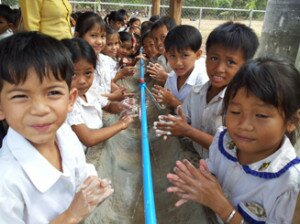
Diseases related to lack of hygiene, such as diarrhea and respiratory infections, are still the leading cause of death for children living in Cambodia. By the time children enter school, more than half have intestinal worms and a vast majority have dental caries – virtually all untreated. Children’s health is closely related to their academic progress and performance in school. Students suffering from pain and disease are frequently absent from school, sleep less, and show an overall lower academic performance compared to healthy pupils.
GIZ’s Regional Fit for School Programmeaims to prevent infectious diseases with three simple and low-cost interventions: 1) daily hand washing with soap; 2) daily tooth brushing with fluoride toothpaste; and 3) bi-annual deworming.
The programme is designed based on the Fit for School approach pioneered in the Philippines with a great success by the Department of Education (DepED) and with support from the local NGO Fit for School Inc. as well as GIZ.
By working with the schools to construct washing facilities and ensuring availability of a functioning, running water system and providing soap and tooth brushing kits to students, the programme supports an enabling environment for students to practice daily hygiene activities together.
“The students clearly enjoy the daily hand washing and tooth brushing activities. Their breath smells better, and the homework papers they hand in are much cleaner because of their freshly washed hands,” said the teacher of a participating primary school, whom was trained by the Regional Fit for School Programme to implement the daily group hygiene activities with students.
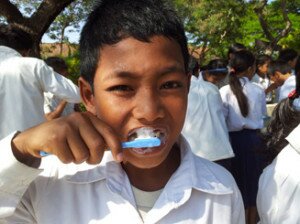
Water and soap – a simple way to prevent disease
Hand washing with soap and water is one of the most effective preventive measures against major infectious diseases. GIZ’s Regional Fit for School Programme is encouraging a change in primary school students’ hand washing behaviour by practicing this everyday. Subsequently, good habits are ingrained at a young age and the students are more likely to continue good hygiene as an adult. The students’ knowledge also sparks their interest to change their hygiene practices at home.
In the long-term, the programme aims to work with the Ministry of Education, Youth and Sport of Cambodia to institutionalize the programme approach and principles into the national school health system, so that the programme can be scaled-up to benefit many more public primary schools and students in Cambodia.
For more information on GIZ’s Regional Fit for School Programme contact:
Ayphalla Te
Country Project Manager
Email: [email protected]
Mobile phone: +855 12 906 908
German Government Delegation witnesses change in health sector
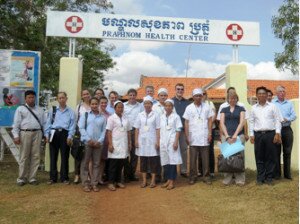
21 March 201
Kampot Province, Cambodia. – In Kampot Province change is happening in the health sector. German Technical and Financial Cooperation jointly support for example, the Pra Phnom Health Centre to improve the quality and accessibility of health care services. As the result, health services utilisation has increased to more than 80% within two years.
On 2-3 March 2013, Dr. Andreas Pfeil, BMZ, headed a delegation from the Federal Ministry of Economic Cooperation and Development Germany (BMZ), GIZ and KfW to Kampot Province to see first-hand how development in the health sector has progressed.
Midwife over sees health centre; ‘responsiveness’ a priority
After visiting the Pra Phnom Health Centre, the delegation went to Chankrey Ting, a rural health facility receiving technical support through GIZ. Unique from others, a female midwife oversees this health facility.
Responsiveness to patient requests and customer service approach impressed the delegation, which is also reflected in the high number of women choosing this health centre for obstetric care.
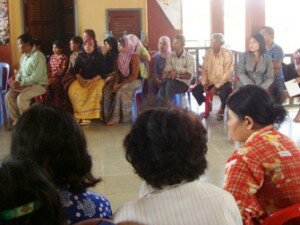 Communities acknowledges Germany’s work in client satisfaction
Communities acknowledges Germany’s work in client satisfaction
Additionally, the delegation met with commune councils and the community, including Khmer Muslims, who expressed their appreciation for Germany’s support to the promotion of client rights and the monitoring of client satisfaction.
Commune councillors requested German Development Cooperation support to address issues of people with disabilities, elderly and chronic diseases in a systematic manner. At EpicArts Café, the delegation intensively exchanged with people living with disabilities, to learn more about their daily challenges.
The delegated also visited a provincial hospital, where they were able to visit the functioning maternity department. In this department, complicated child delivery, safe abortion, new-born care and referral services offered. The delegation was also once more impressed by the preceptor-training programme, which aims to improve the quality practical training of nurse and midwifery students.
For more information, contact
Dr. Bernd Schramm
E-mail: [email protected]
Tel: + 855 23 88 44 76
GIZ’s indigenous community land registration initiative ranks as largest effort to secure indigenous land rights in Cambodia
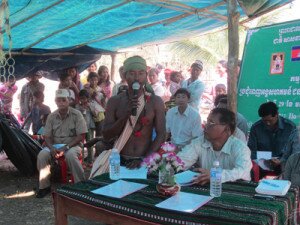
19 March 2013
Preparing 95 indigenous communities for collective land registration
Phnom Penh, Cambodia – In December 2012, GIZ’s Land Rights Programme signed an agreement to work with the International Labour Organization to help 90 indigenous communities in Cambodia take steps to prepare for the registration of their collective lands.
Following this, in January 2013 GIZ cooperation led to an additional five indigenous communities preparing for land registration. Altogether, this is the largest single effort any government or organization has ever made to assist indigenous communities in Cambodia secure their land rights. In 2001, a Land Law outlined indigenous communities’ land rights, and in 2009, a sub-decree on registering indigenous lands was issued. GIZ’s work builds on these legal documents.
First 5 indigenous communities register land – over 400 to follow
Cambodia has approximately 450 indigenous communities. Currently, the land of only five of these communities has been registered: three were registered with GIZ’s support, two with Canadian support
However, GIZ anticipates that through Canadian support three more communities will achieve registration by May 2013. The registration includes land that the indigenous peoples use for farming, residence, and for cultural purposes such as burial areas and spirit forests.
These eight communities are taking major steps in history, as they are the first to have ever applied for land registration. Others have taken various official steps that precede filing for land registration applications, which include receiving acknowledgement as an indigenous community by the Ministry of Rural Development and obtaining legal status recognition by Ministry of Interior. Legal status enables indigenous communities to hold land titles.
GIZ aims to help as many indigenous communities with land title applications as possible
A key objective of GIZ’s Land Rights Programme’s work is to help as many as possible with the land title application filing process.
Under a 2011 joint circular of the Ministries of Interior and of Land Management, Urban Planning and Construction the filing of these applications triggers provincial governors issuing interim protection letters for the lands specified in the applications. Once issued, these letters prohibit private transactions, but do not affect pre-issued concessions.
As stated in the circular, the letters do not apply to “those plots that the Royal Government has agreed in principle for investment or development – prior to these measures coming into effect.”
The concession exclusion poses serious limitations to issued letters’ effectiveness. Nevertheless, the letters are the only legal protection that currently exists until the community’s land registration process is complete.
For more information on GIZ’s Land Rights Programme, please contact: Mr. Poch Sophorn, Senior Advisor on Land Policy, Land Rights Program at [email protected].

